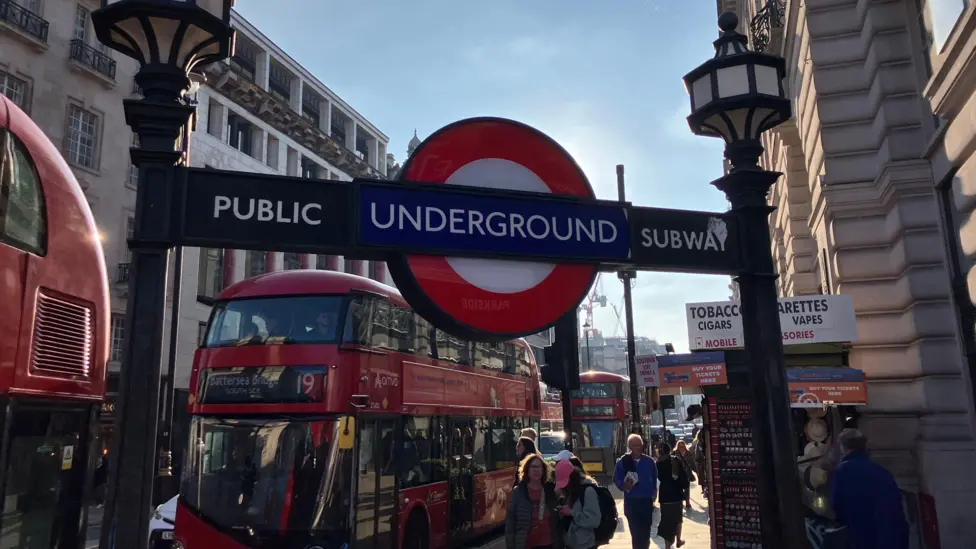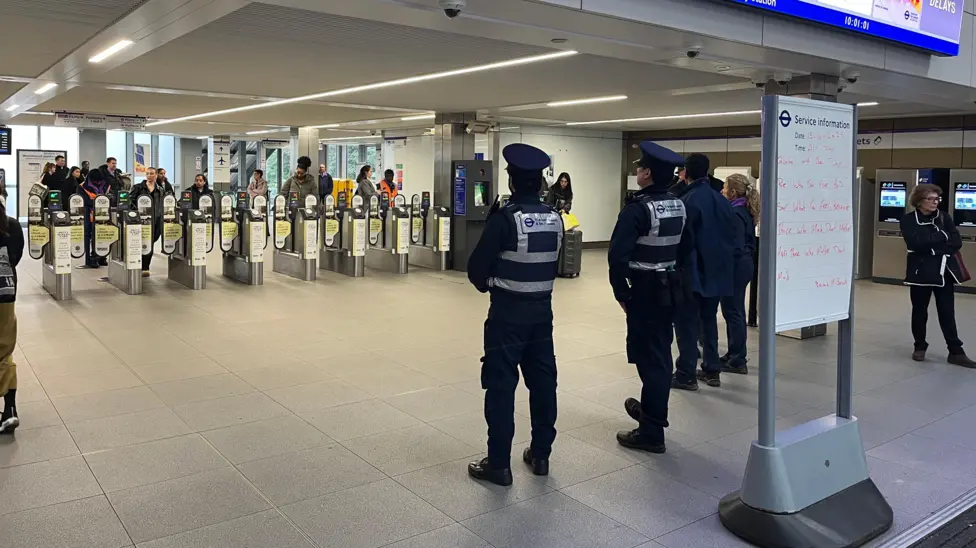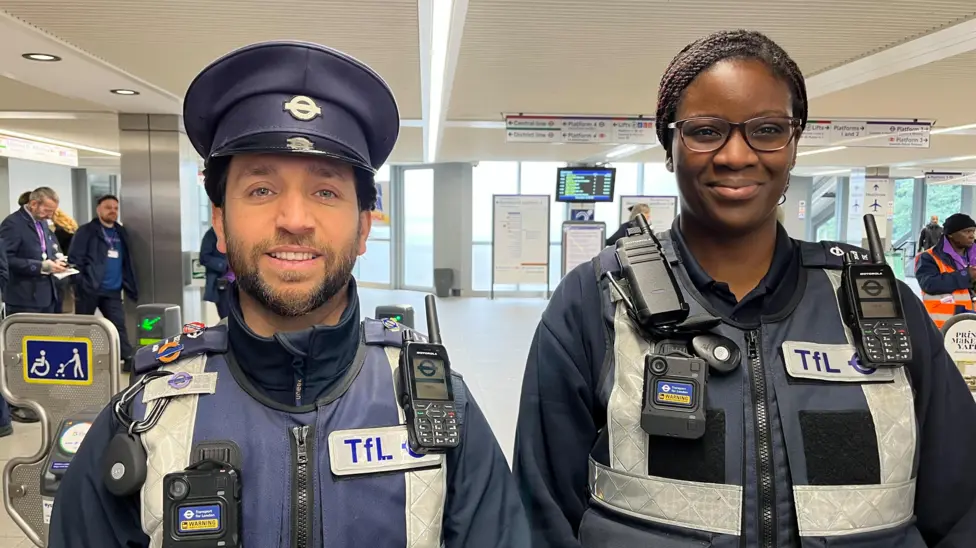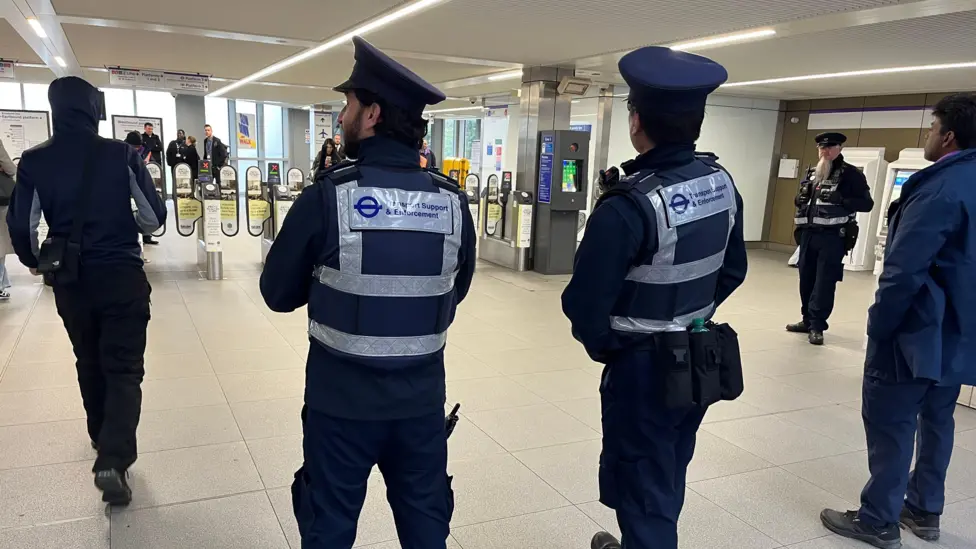| Re: London's fare dodgers - ongoing issue and discussion here on the forum Posted by TaplowGreen at 19:03, 15th November 2025 |     |
More people push through than go over, so taller barriers won't help. It's easier to go through too as the barriers aren't allowed to be strong enough to deliberately trap you.
.....and to be honest, whether they push through or go over they are rarely challenged by TfL staff.
| Re: London's fare dodgers - ongoing issue and discussion here on the forum Posted by plymothian at 19:00, 15th November 2025 |     |
More people push through than go over, so taller barriers won't help. It's easier to go through too as the barriers aren't allowed to be strong enough to deliberately trap you.
| Re: London's fare dodgers - ongoing issue and discussion here on the forum Posted by Chris from Nailsea at 17:59, 15th November 2025 |     |
From the BBC:

An estimated 3.5% of fares were evaded in the year to March 2025
Taller ticket barriers, dedicated fare evasion teams in stations and the creation of a taskforce would reduce fare dodging on Transport for London (TfL) services, City Hall Conservatives have claimed.
The number of prosecutions for fare evasion on the Tube reached their highest level for six years in 2023-24, figures obtained by the BBC show.
Thomas Turrell, Conservative transport spokesman, said the mayor of London "continues to pay lip service to the problem in spite of the concern Londoners have when using the Tube".
TfL said its "data-driven strategy" to tackle fare evasion was "already making an impact, with the pan-TfL fare evasion rate dropping to 3.5% from 3.8% in 2023-24". TfL previously said it had spent nearly £14.2m cracking down on fare dodging across the Tube and £7.7m on the bus network in 2023-24, collecting £1.3m in penalty charges.
Penalty fares are set at £100, reduced to £50 if paid within 21 days.
The Conservatives said TfL's target was to reduce fare evasion from 3.4% to 1.5% by 2030, however based on current trends, that "simply isn't going to happen", said Turrell.
"Every Londoner has watched someone push through the barriers or jump over them to avoid paying the fare, knowing full well that they will be picking up the cost of the offender's non-payment in the form of eye-watching fare rises," he said. "It's not good enough, and Londoners are fed up with watching this happen unchallenged."
But Elly Baker, chair of the Transport Committee on the London Assembly, said the Tories were "political grandstanding".
"A recent cross-party Transport Committee report focused on improving safety and confidence through better staffing. The Conservatives could have put some of their suggestions into this report, but chose not to. They have chosen political grandstanding rather than suggesting practical solutions."
In May, shadow justice secretary Robert Jenrick posted a video on social media of him approaching people who had not paid. At the time, the Conservative said he was "sick to death of people fare dodging" and felt he needed to "highlight the issue".
| Re: London's fare dodgers - ongoing issue and discussion here on the forum Posted by Mark A at 13:12, 20th October 2025 |     |
Reminds me of the guy on a Southern train up to Victoria whose M.O. was weirding out single women travellers in an attempt to extract cash. When forcefully challenged he'd move to the next carriage. On arrival at Victoria he blew through the barrier staff in about 90 seconds and then prowled round the concourse being mildly coercive with a series of victims, then, Wetherspoons, ditto, followed by a five minute stop by BTP that got nowhere, a few minutes after that he was over the other side of the station, undeterred and probably well known to all the people who challenged him. His misfortune to be born with a Marty Feldmann face but boy was he taking advantage of that and not in a good way.
Mark
| London's fare dodgers - ongoing issue and discussion here on the forum Posted by Chris from Nailsea at 11:00, 20th October 2025 |     |
From the BBC:
The passenger is not happy and starts arguing with the officers. We are in the concourse of Ealing Broadway Elizabeth line station which is a fare evasion hotspot. The Transport for London (TfL) enforcement team has asked him to produce his ticket after the barriers flashed he was travelling on a child fare. He certainly doesn't look like a child.
The argument gets more and more heated with the passenger insisting the barrier machine has taken his ticket and that's why he can't produce it. Rather comically he turns out his pockets. He is trying to charm his way out of the situation.
The laughs slowly stop as it becomes clear he is in trouble. Suddenly, he bolts straight out of the station. The officers shout at him and try to shepherd him away from the exit but there doesn't seem to be much they can do. They aren't allowed to restrain him or arrest him. They have a hands-off policy and their safety comes first.
Welcome to the world of trying to stop London's fare evaders.

The officers have seen it all. People hurdling the barriers, or even crawling under them. There is a lot of "double gating" where the evader tucks in behind someone else going through the barriers. These officers are in Ealing Broadway to try and stop fare evasion.
It is a huge problem for TfL, costing it £190m a year. Fare evasion has increased since the opening of the Elizabeth line as more passengers use the TfL network, and many stations on the line don't have staffed barriers. The loss equates to 3.5% of all fare income. TfL wants to get that down to 1.5% by 2030 although it admits this will be a significant challenge.

Nasir Ahmadi, one of the officers, told BBC London: "One of their main excuses is, 'It's very expensive, we can't afford it.' 'We can't afford it' or 'Transport should be free' or 'I left my Oyster card at home or my bankcard at home', things like that. The fact of the matter is everyone is paying their fare and they should be paying for their fare. It's not fair on the general public that they are paying for their fare and you're double gating and pushing your way through."
Another revenue protection, Tomi Ogunsuyi, has also heard plenty of excuses: "On a daily basis we usually see people pushing through the barriers. We see them crawling through as well. Our aim is to stop the violence and aggression and to support the front-line staff. We tend to hear common excuses like, 'I haven't got any money, I didn't know. Why can't travelling be free?' We tend to hear a lot of excuses, to be honest, but we are quite used to it so we explain the reason why everyone should pay for their journey."
Over a three-month period this year, TfL had 9,934 open cases under consideration for prosecution for fare evasion, including both one-off and repeat offenders. Since April, it has issued more than 30,000 fixed penalty notices, which have recently been increased to £100, and has reported over 9,000 individuals for possible prosecution.
Tfl says it is also increasing the number of on-train checks. It says its enforcement teams have completed over 2.8 million checks on board Tubes and trains. It also uses a combination of data, travel pattern analysis and CCTV to identify persistent evaders.

TfL's head of compliance, Anand Nandha, says they have just employed a team of specialist investigators to focus on persistent offenders. He won't go into too much detail about how they track offenders down but he's confident they will catch more passengers who don't pay their fare. "It's not a victimless crime at all," he told me. "We have customers who pay their fare and they will end up having to pay more because we are losing more revenue on the network. So we want to ensure that revenue is used for public services and to help [keep] fares at a low level.
"We have up to 500 revenue inspection officers deployed on the network. We are using different methods of detection. We have a team of investigators who we have just employed who will use different methods to go after persistent offenders, like plain-clothes operations on the network. We are also looking at technology. We have numerous sources of data to look at patterns of fare evasion and we are also looking at infrastructure on the network to see how else we can reduce fare evasion."
The argument gets more and more heated with the passenger insisting the barrier machine has taken his ticket and that's why he can't produce it. Rather comically he turns out his pockets. He is trying to charm his way out of the situation.
The laughs slowly stop as it becomes clear he is in trouble. Suddenly, he bolts straight out of the station. The officers shout at him and try to shepherd him away from the exit but there doesn't seem to be much they can do. They aren't allowed to restrain him or arrest him. They have a hands-off policy and their safety comes first.
Welcome to the world of trying to stop London's fare evaders.

The officers have seen it all. People hurdling the barriers, or even crawling under them. There is a lot of "double gating" where the evader tucks in behind someone else going through the barriers. These officers are in Ealing Broadway to try and stop fare evasion.
It is a huge problem for TfL, costing it £190m a year. Fare evasion has increased since the opening of the Elizabeth line as more passengers use the TfL network, and many stations on the line don't have staffed barriers. The loss equates to 3.5% of all fare income. TfL wants to get that down to 1.5% by 2030 although it admits this will be a significant challenge.

Nasir Ahmadi, one of the officers, told BBC London: "One of their main excuses is, 'It's very expensive, we can't afford it.' 'We can't afford it' or 'Transport should be free' or 'I left my Oyster card at home or my bankcard at home', things like that. The fact of the matter is everyone is paying their fare and they should be paying for their fare. It's not fair on the general public that they are paying for their fare and you're double gating and pushing your way through."
Another revenue protection, Tomi Ogunsuyi, has also heard plenty of excuses: "On a daily basis we usually see people pushing through the barriers. We see them crawling through as well. Our aim is to stop the violence and aggression and to support the front-line staff. We tend to hear common excuses like, 'I haven't got any money, I didn't know. Why can't travelling be free?' We tend to hear a lot of excuses, to be honest, but we are quite used to it so we explain the reason why everyone should pay for their journey."
Over a three-month period this year, TfL had 9,934 open cases under consideration for prosecution for fare evasion, including both one-off and repeat offenders. Since April, it has issued more than 30,000 fixed penalty notices, which have recently been increased to £100, and has reported over 9,000 individuals for possible prosecution.
Tfl says it is also increasing the number of on-train checks. It says its enforcement teams have completed over 2.8 million checks on board Tubes and trains. It also uses a combination of data, travel pattern analysis and CCTV to identify persistent evaders.

TfL's head of compliance, Anand Nandha, says they have just employed a team of specialist investigators to focus on persistent offenders. He won't go into too much detail about how they track offenders down but he's confident they will catch more passengers who don't pay their fare. "It's not a victimless crime at all," he told me. "We have customers who pay their fare and they will end up having to pay more because we are losing more revenue on the network. So we want to ensure that revenue is used for public services and to help [keep] fares at a low level.
"We have up to 500 revenue inspection officers deployed on the network. We are using different methods of detection. We have a team of investigators who we have just employed who will use different methods to go after persistent offenders, like plain-clothes operations on the network. We are also looking at technology. We have numerous sources of data to look at patterns of fare evasion and we are also looking at infrastructure on the network to see how else we can reduce fare evasion."










